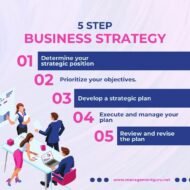Posted by Managementguru in Business Management, International Business, Leadership, Marketing, Operations Management, Principles of Management, Sales, Strategy
on Mar 26th, 2014 | 0 comments

Some business firms with a modest and humble beginning make it to the top in a very short span of time. How do you think this is possible? They have a clear strategic vision that guarantees success. Success does not come that easy. You have to have real focus backed up by solid strategies for such resounding success. A strategy is a comprehensive plan of action that sets critical direction and guides the allocation of resources to achieve long-term organizational objectives. Some people formulate strategies and follow suit, some flow along with the stream of situations and react accordingly, rather than merely plotting strategies. Mere strategizing is not enough, you have to look into the actual situation and how it would affect your operations. Learn Sales Hacking Essential sales skills, sales strategies and sales techniques to sell just about anything! Let us have a clear understanding on the reasons for formulating a strategy Business has gone global for many reasons, including reactive ones like, international competition, customer demands and trade barriers, and proactive ones like seeking economies of scale, new international markets, resource access and cost savings. After the liberalization, globalization and privatization processes activated in full swing, many firms have come to the limelight in the international market scenario, which has provided them with a solid head start. Companies have to respond to both changes in the external environment and emerging opportunities. An opportunity not well utilized is an opportunity lost. Rational planning is called for to meet international expansion through workable strategies. International corporate strategy is purely based on the intentions of your firm, the objectives that stem out from your vision and can be materialized by scanning the environment for threats and opportunities, assessing the internal strengths and weaknesses of the firm, considering alternative international entry strategies and firming up on the workable ones. List down the answers to the following questions and you may arrive at a reasonable conclusion on your company’s market standing. Strengths What are your advantages?What is the activity that you specialize in?What is your uniqueness that differentiates you from your competitors? Your own viewpoint and that of the people you deal with is necessary. It is important to be honest and realistic. This exercise helps you and your team to understand the mission and purpose. Weaknesses What is done badly?What could be done better?What should be avoided?What causes problems or complaints? To identify the unpleasant truths as quick as possible is the notion of this exercise. Ascertain Your Priorities After ascertaining the priorities, the strategic management process is carried out with well laid plans, executed by professional strategists followed by implementation of control and evaluation procedures. Any corporate firms go for strategic alliances, that may include, acquisitions, mergers, joint ventures, strategic partnerships, cartel agreements and so on to survive in the international market as well as to exploit the opportunities available in the global market with the available potential resources put to optimal...

Posted by Managementguru in Human Resource, Organisational behaviour, Principles of Management, Training & Development
on Mar 19th, 2014 | 0 comments

Coaching and Mentoring are the two strategic pillars of a business organisation without which the employees would be mere robots working without job satisfaction. The Definition. A coach is someone who provides guidance to a client on their goals and helps them reach their full potential. A mentor is someone who shares their knowledge, skills and/or experience, to help another to develop and grow. Objectives of Coaching The main purpose of coaching is to develop the employee as an effective perfomer. It involves the following: 1) Helping him to realise his potential as a manager. 2) Helping him to understand himself – his strengths and his weaknesses. 3) Providing him an opportunity to acquire more insight into his behaviour, and analyse the dynamics of such behaviour. 4) Helping him to have better understanding of the environment. 5) Increasing his personal and inter-personal effectiveness through effective feedback. 6) Encouraging him to set goals for further improvement. 7) Encouraging him to generate alternatives for dealing with his problems and prepare an action plan. 8) Helping him to review in a non-threatening way his progress in achieving various objectives. 9) Providing empathetic atmosphere for sharing and discussing his tensions, conflicts, concerns and problems. Download this Coaching Goals planner that will help you in measuring the outcome effctively. 👇 Coaching-Goals-PlannerDownload Objectives of Mentoring The main purpose of mentoring is to provide opportunity to young people to share their concerns and get both moral support and guidance for their development. It involves the following : 1) Establishing a relationship of trust 2) Modeling beahviorual norms for the young person 3) Listening to the person’s concerns and problems 4) Helping him to search alternative solutions for the problems 5) Sharing own relevant experiences 6) Responding to his emotional needs, without making him depend on the mentor 7) Developing long-lasting, personal, and informal relationship. Who is your most trusted advisor when it comes to important issues affecting your business? A small stats in percentage. Fellow business owner – 31Business coach – 24Family member – 18Accountant – 8Employee – 6Consultant – 4Friend – 3Lawyer – 2Other – 4 In which areas would a business coach have the most impact for your business? Strategic planning – 31PR / Marketing / Social media – 14Leadership – 11Succession planning – 9Managing change – 8Profitability – 8Productivity – 7Employee relations – 5Other – 7 Five Tips for Coaching Employees Define your role as a coach Create a safe environmentHelp them define and verbalize their answers, directions and actions. 2. Listen to what is said Be curious, Seek to understand“Tell me more….” “What’s happening….” 3. Observe what is heard and seen Focus on just the factsShare what you observe providing a judgement-less summary.“Here is what I heard you say….”“So it sounds like you are or want to….” 4. Validate what is felt -share the emotion and acknowledge it 5. Empower what is possible – Forward the thinking, explore, options showing faith and optimism. If you are like most of us, you are constantly striving for more engaged employees. Engagement not only leads to higher job satisfaction and lower turnover but also increases productivity and revenue. But how do we boost engagement among our teams? The answer is through coaching. 80% of those who have received coaching report positive impact in areas such as work performance, communication skills, well-being and business management strategies. Download this Achieving Goals Planner to form an idea about effective habits. 👇 Achieving-Goals-PlannerDownload 65% of employees in a strong coaching culture are highly engaged. Organisations with strong coaching cultures report revenues above those of their industry peer group and report higher employee engagement. While more and more organisations are using coaches as a key strategy...

Posted by Managementguru in Entrepreneurship, Human Resource
on Feb 25th, 2014 | 0 comments

Who is an Entrepreneur? An entrepreneur is one with long term vision, creativity, uniqueness and the most conspicuous feature is undoubtedly his risk taking ability. He embarks on uncertain investments and also possesses an unusually minimal level of uncertainty aversion. He always comes out with brilliant business ideas since he is open to new information available in the rapidly changing business environment; this also facilitates self-directed and independent decisions aiding in quick growth maximization of the business enterprise. Concept of Entrepreneurship Entrepreneurship is all about action that involves opportunity exploitation and venture creation. The concept of entrepreneurship is becoming increasingly popular in developing countries as it tends to promote economic growth of a nation. “No entrepreneur, no development,” is the kind of significance attached with entrepreneurialism. Who is an Entrepreneur Though entrepreneurship is an individual’s free choice activity, it emerges and functions in a social and cultural setting. An entrepreneur must be prudent in choosing a business activity that will be supported and valued by the society and that which improves his economic standards. Consumers are always on the look-out for a product or a service that is different but unique. This proves to be an advantage for an entrepreneur to exploit the unexplored niches of the market segment. An entrepreneur has to observe and act upon opportunities that are unusual but promising. He has to study the pros and cons of a project in terms of capital investment, plant layout, production facility, labor availability, market proximity, demography, people’s preference and economic viability. The distinct features of an entrepreneur for a better understanding: Persistence and perseveranceResourcefulness to take the business activity to the next levelEternal quest for knowledgeQuality consciousSystematic planningSelf-confidenceDaringCrisis management with easePersuasion –capability to convince the customers and othersStrategy king Excellent communication skills Proficiency in a variety of subjects and disciplinesTo them , work is passionNonchalance and the like. It is the combination of body of knowledge, set of skills and cluster of appropriate motives that makes an entrepreneur a star performer. He is the pivot about which all other factors of production, productive resources and techniques revolve. Innovativeness, risk taking ability and proactiveness are the three dimensions fundamental to the concept of entrepreneurship. Entrepreneurship is a way of thinking, reasoning and acting that is opportunity obsessed (Timmons). Lakshmi Mittals and Warren Buffets belong to this category where in they have created value through recognition of business opportunities. https://www.instagram.com/p/B-t7sPKHkq4/ Follow YoungHstlrs and Entrepreneurzone for Business and Entrepreneurship...






